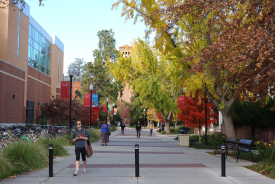SpaceX made headlines earlier this month when CEO and founder Elon Musk revealed his plans to colonize Mars with one million people within 10 years. He also unveiled the Interplanetary Transport System (ITS).
Apparently, the SpaceX founder and CEO plans to create a gigantic rocket - one that is more comfortable and larger than the Saturn V, which sent humans to the moon. It is believed to go on orbit, be refueled using multiple launches, go to Mars, enter the planet's atmosphere using aerodynamic braking to slow down and land on its tail.
Last week, Boeing Chief Executive Officer Dennis Muilenberg revealed that the aerospace company to be the creator of the rocket that will first land on Mars. Boeing is said to be focusing on building the commercial space sector near earth and, at the same time, develop technology which will be used to venture beyond the moon. The aerospace giant is working with the National Aeronautics and Space Administration (NASA) to create a heavy-lift rocket for deep space exploration called the Space Launch System (SLS).
Boeing and SpaceX's Mars missions will definitely have an impact on society especially on higher education. It will create more jobs which, in turn, will require colleges and universities to keep up with the facilities and resources needed to equip the future workforce.
According to Futurist Speaker, within the next 10 years, jobs such as augmented reality architects, business colony managers, wind turbine repair techs and elevated tube transport engineers, among others, are expected to pop up. Moreover, in the year 2030, jobs like gravity pullers, geoengineers and space-based power system designers would be in-demand.
This is why, The Guardian noted, teaching graduates to be flexible should be one of the top concerns of educators rather than worrying about jobs that aren't in existence yet. It was found that 65 percent of children who start primary school today will work in jobs that don't exist yet.
Today's generation of students saw the rise of apps and social media. Now, there are a lot of app developers, data analysts and social media managers. The near future may see graduates who specialize in aerospace as a common thing.
© 2025 University Herald, All rights reserved. Do not reproduce without permission.








